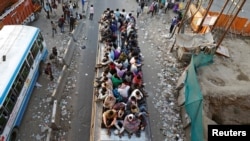Human Rights Watch is expressing concern for the fate of millions of migrant workers in the Persian Gulf region, as host countries lock down, and employers withhold wages or consider layoffs amid strict coronavirus containment measures that are leading in some cases to deportations and confinement.
Advocacy groups such as Human Rights Watch and Amnesty International say they are worried for the health and safety of foreign migrants working in construction, the service sector and managerial positions in the oil-rich Gulf region.
Those from Pakistan, India, Bangladesh and Nepal make up about 10 percent of all migrants worldwide, they say, and even before the COVID-19 outbreak, often faced appalling work and housing conditions.
So far, Gulf countries including Saudi Arabia, the United Arab Emirates, Qatar, Bahrain and Oman have reported more that 3,300 coronavirus cases. Gulf migrant researcher Hiba Zayadin at Human Rights Watch tells VOA that cramped accommodations and inadequate sanitation facilities are endangering migrants in the Gulf region who may also lack access to health care.
“Often, labor accommodation and immigration and detention centers are often overcrowded. They lack hygienic standards, poor ventilation, lack of access to adequate medical care. Food is not up to international standards. These are all things that can exacerbate the current situation and make the fear of the spread of the coronavirus more catastrophic. So, that’s the main and most immediate concern that we are looking at,” Zayadin said.
Zayadin says Human Rights Watch is urging Gulf governments to find safe housing alternatives. Even under ordinary conditions, dismal migrant accommodations might involve six to 10 people sharing a room.
Migrant workers in the Gulf, she says, are disadvantaged under a labor sponsorship system that gives employers excessive powers over migrant workers, which can foster abuse and exploitation. Zayadin fears that with the economic downturn due to COVID-19, migrants could be further exploited.
“Generally, it’s very difficult for people to get back wages that they are owed for a variety of reasons — incompetence, companies going bankrupt, insurance funds not being operationalized. And this will ... we’ll see a lot more, as financial hardships for migrant workers are going to face is huge. Layoffs, that is something we’re definitely seeing. People just being kept in their accommodations under lockdown and not being paid, even though they are on fixed-term salaries. People who are being compelled to work, even though they feel they should be working, especially when there are bans on gathering in many of these countries," Zayadin said.
Zayadin says that some companies are taking measures to protect migrant workers. Also, some countries are helping to repatriate guest workers.
But Zayadin says that Nepali workers who might want to go home are unable to, as Nepal has shut its borders even to its nationals.




